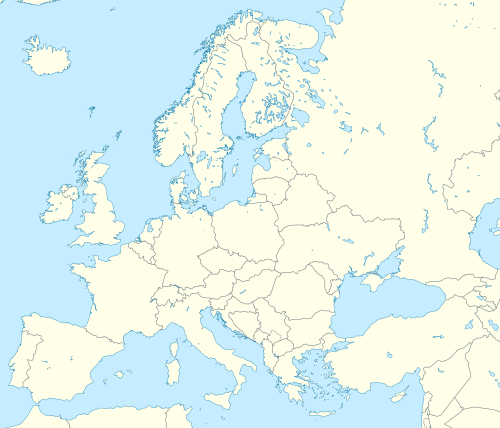Top Qs
Timeline
Chat
Perspective
2019–20 EHF Champions League
European club handball tournament From Wikipedia, the free encyclopedia
Remove ads
The 2019–20 EHF Champions League was the 60th edition of Europe's premier club handball tournament and the 27th edition under the current EHF Champions League format.[1]
Because of the COVID-19 pandemic in Europe, the knockout stage matches were postponed and later cancelled. The Final Four, which took place at the Lanxess Arena in Cologne, Germany, was moved from May to December and was contested by the top two teams from Groups A and B – Barça, Paris Saint-Germain, THW Kiel and Telekom Veszprém.[2][3] As a result, reigning champions Vardar were not able to defend their title.
Remove ads
Format
Summarize
Perspective
The competition begins with a group stage featuring twenty-eight teams divided in four groups: Groups A and B contain eight teams, while Groups C and D contain six teams. Matches are played in a double round-robin system with home-and-away fixtures. In Groups A and B, the top six teams qualify for the knockout stage, with teams ranked 2nd–6th entering the round of 16 and the group winners advancing directly to the quarter-finals. In Groups C and D, only the top two teams advance to a compete in a two-legged play-off round, with the two winners going through to the knockout stage round of 16.
The knockout stage includes four rounds: the round of 16, quarterfinals, and a final-four tournament comprising two semifinals and the final. In the round of 16, twelve teams (ten from Groups A and B, and the two play-off winners from Groups C and D) are paired against each other in two-legged home-and-away matches. The six aggregate winners of the round of 16 advance to the quarterfinals, joining the winners of Groups A and B. The eight quarterfinalist teams are paired against each other in two-legged home-and-away matches, with the four aggregate winners qualifying to the final-four tournament.
In the final four tournament, the semifinals and the final are played as single matches at a pre-selected host venue.
Remove ads
Team allocation
A total of 35 teams from 21 countries submitted their application for a place in the competition's group stage before the deadline of 12 June.[4] The final list of 28 participants was revealed by the EHF Executive Committee on 21 June.[5]
Remove ads
Round and draw dates
The draw was held on 27 June 2019 in Vienna, Austria.[6]
Group stage
Summarize
Perspective
The draw for the group stage was held on 27 June 2019 in Vienna, Austria. The teams were drawn into four groups, two containing eight teams (Groups A and B) and two containing six teams (Groups C and D). The only restriction was that teams from the same national association could not face each other in the same group.
In each group, teams played against each other in a double round-robin format, with home and away matches.
After completion of the group stage matches, the teams advancing to the knockout stage were determined in the following manner:
- Groups A and B – the top team qualified directly for the quarterfinals, and the five teams ranked 2nd–6th advanced to the first knockout round.
- Groups C and D – the top two teams from both groups contested a playoff to determine the last two sides joining the 10 teams from Groups A and B in the first knockout round.
Group A
Source: EHF
Notes:
Notes:
Group B
Source: EHF
Notes:
Notes:
Group C
Source: EHF
Notes:
Notes:
Group D
Source: EHF
Notes:
Notes:
Playoffs
The top two teams from Groups C and D contested a playoff to determine the two sides advancing to the knockout phase. The winners of each group faced the runners-up of the other group in a two-legged tie.
Overview
Remove ads
Knockout stage
Summarize
Perspective
The winners of Groups A and B would have advanced directly to the quarterfinals, while the teams ranked 2nd–6th to the round of 16 alongside the playoff winners. After the cancellation of the last 16 and quarterfinals on 24 April 2020, the top-two placed teams from each group played the final four.[3]
Round of 16
Quarterfinals
Final four
The final four was scheduled to be held at the Lanxess Arena in Cologne, Germany on 30 and 31 May but was rescheduled to 22 and 23 August 2020,[7][2][8] and later to 28 and 29 December 2020. Because of the cancellation of the last 16 and quarterfinals, the first two-placed teams from the group stage groups will play in the final four.[3] The draw was held on 10 November 2020.[9][10]
Bracket
| Semifinals | Final | |||||
| 28 December | ||||||
| 36 | ||||||
| 29 December | ||||||
| 35 | ||||||
| 33 | ||||||
| 28 December | ||||||
| 28 | ||||||
| 37 | ||||||
| 32 | ||||||
| Third place | ||||||
| 29 December | ||||||
| 26 | ||||||
| 31 | ||||||
Final
| 29 December 2020 20:30 |
THW Kiel |
33–28 | Lanxess Arena, Cologne Attendance: 0[note 1] Referees: Gubica, Milošević (CRO) | |
| Ekberg 8 | (19–16) | Gómez 10 | ||
| 1× |
Report | 4× |
Remove ads
Statistics and awards
Top goalscorers
Awards
The all-star team was announced on 12 June 2020.[13]
- Goalkeeper:
 Niklas Landin
Niklas Landin - Right wing:
 Niclas Ekberg
Niclas Ekberg - Right back:
 Alex Dujshebaev
Alex Dujshebaev - Centre back:
 Mikkel Hansen
Mikkel Hansen - Left back:
 Sander Sagosen
Sander Sagosen - Left wing:
 Manuel Štrlek
Manuel Štrlek - Pivot:
 Bence Bánhidi
Bence Bánhidi
- Other awards
- Best Defender:
 Blaž Blagotinšek
Blaž Blagotinšek - Best Young player:
 Aleix Gómez
Aleix Gómez - Best Coach:
 David Davis
David Davis
Remove ads
Notes
- The match was played behind closed doors due to the COVID-19 pandemic.
References
External links
Wikiwand - on
Seamless Wikipedia browsing. On steroids.
Remove ads
